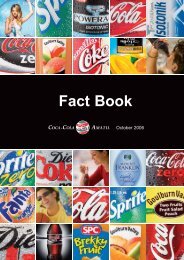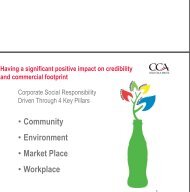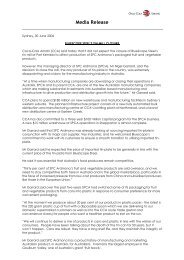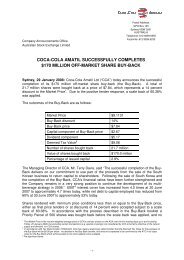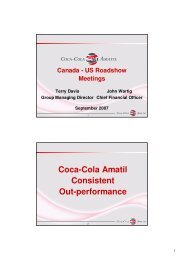2006 Sustainability Report - Coca-Cola Amatil
2006 Sustainability Report - Coca-Cola Amatil
2006 Sustainability Report - Coca-Cola Amatil
You also want an ePaper? Increase the reach of your titles
YUMPU automatically turns print PDFs into web optimized ePapers that Google loves.
Water<br />
We have made a number of operational<br />
changes in our production plants and<br />
invested in new technology to improve<br />
ongoing savings of mains water.<br />
This has resulted in CCA achieving<br />
best practice in the global Coke<br />
system for efficient water use. In<br />
Australia in <strong>2006</strong> production of all<br />
carbonated and non-carbonated<br />
beverages (including soft drinks,<br />
water, sports drinks and juice)<br />
achieved a ratio of 1.55 litres of<br />
water to make 1 finished litre of<br />
beverage (L/FBL). This compares<br />
with <strong>Coca</strong>-<strong>Cola</strong> Enterprises in the US,<br />
which uses 1.86 L/FBL and the global<br />
average for TCCC bottlers of 2.60 L/FBL.<br />
CCA submits water savings action<br />
plans to all Australians states which<br />
currently require them – NSW,<br />
Victoria, Queensland, South Australia.<br />
In Indonesia Water Resource<br />
Management systems are being<br />
implemented to minimise water use in<br />
all plants.<br />
CCA is currently preparing a response<br />
to TCCC’s Global Water Stewardship<br />
Strategy which will document<br />
initiatives in water efficiency,<br />
wastewater compliance, watershed<br />
management, water quality and social<br />
aspects in beverage operations across<br />
the Group.<br />
Energy<br />
While energy costs are a very small<br />
percentage of CCA’s overall cost base,<br />
energy reduction and improvements in<br />
energy efficiency are key components<br />
of each Australian state-based core<br />
business plan.<br />
CCA in Australia is a voluntary<br />
member of the Australian<br />
Government’s Greenhouse<br />
Challenge Plus Program and<br />
reports annually on greenhouse<br />
gas (GHG) emissions and reductions.<br />
CCA also participates in various statebased<br />
reporting programs examining<br />
energy consumption, as required.<br />
In <strong>2006</strong> CCA Australia participated<br />
in the Carbon Disclosure Project<br />
(CDP) for the first time. The CDP<br />
provides a secretariat for the world’s<br />
largest institutional investor<br />
collaboration on the business<br />
implications of climate change. The<br />
website (www.cdproject.net) is the<br />
world’s largest registry of corporate<br />
GHG emissions.<br />
In <strong>2006</strong>, GHG emissions from<br />
CCA’s Australian carbonated<br />
beverage business and the Victorian<br />
juice business was reported as 106,779<br />
tonnes of CO 2 . Our KPI for energy<br />
efficiency is tonnes of CO 2 equivalent<br />
(CO 2 e) emissions per kilolitre of<br />
finished beverage. In <strong>2006</strong> our KPI<br />
value was 62.86 kg CO 2 e/kFBL, an<br />
improvement on our 2005 KPI of<br />
0.31 CO 2 e/kFBL.<br />
In 2007 energy efficiency will emerge<br />
as CCA’s lead environmental key<br />
performance indicator.<br />
Other areas where we are gathering<br />
information to quantify impacts and<br />
identify opportunities centre on fleet<br />
fuel consumption and our equipment<br />
division. We aim to report more<br />
comprehensively on these areas in<br />
the future.<br />
Waste<br />
Waste from operations includes<br />
unused packaging, paper and<br />
cardboard, timber, pallets, scrap metal,<br />
canteen waste, fruit and vegetable<br />
processing pulp and residue from<br />
water and wastewater treatment<br />
processes. Waste is either returned to<br />
the supplier, recycled through markets<br />
or disposed into landfill.<br />
In Australia and New Zealand<br />
more than 80% of waste is recycled,<br />
thanks to well-developed recycling<br />
markets and defined waste<br />
management systems onsite. Most<br />
fruit processing waste at SPCA is<br />
recycled as stock feed.<br />
In our developing country operations,<br />
waste is recycled where there is a<br />
viable market. Materials recycled<br />
include aluminium, PET, cardboard,<br />
glass, scrap metal, timber, stretch and<br />
shrink film, plastic caps and paper.<br />
In future we will collaborate with<br />
suppliers to reduce waste items<br />
brought on site.<br />
CCA undertook a waste audit of<br />
head office in Sydney which resulted<br />
in an internal staff education<br />
campaign around recycling.<br />
15



